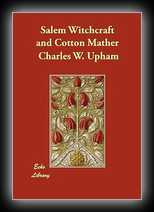
Salem Witchcraft and Cotton Mather A Reply
by Charles W. Upham
1869
Salem Witchcraft and Cotton Mather A Reply By Charles W. Upham, this ebook included TOC for Reader. This sample in ebook "The Reviewer charges me with having wronged Cotton Mather, by representing that he "got up" the whole affair of the Goodwin children. He places the expression within quotation marks, and repeats it, over and over again. In the passage to which he refers—p. 366 of the second volume of my book—I say of Cotton Mather, that he "repeatedly endeavored to get up cases of the kind in Boston. There is some ground for suspicion that he was instrumental in originating the fanaticism in Salem." I am not aware that the expression was used, except in this passage. But, wherever used, it was designed to convey the meaning given to it, by both of our great lexicographers. Worcester defines "to get up, 'to prepare, to make ready—to get up an entertainment;' 'to print and publish, as a book.'" Webster defines it, "to prepare for coming before the public; to bring forward." This is precisely what Mather did, in the case of the Goodwin children, and what Calef put a stop to his doing in the case of Margaret Rule.
In 1831, I published a volume entitled Lectures on Witchcraft, comprising a history of the Delusion, in Salem, in 1692. In 1867, I published Salem Witchcraft, and an account of Salem Village; and, in the Preface, stated that "the former was prepared under circumstances which prevented a thorough investigation of the subject. Leisure and freedom from professional duties have now enabled me to prosecute the researches necessary to do justice to it. The Lectures on Witchcraft have long been out of print. Although frequently importuned to prepare a new edition, I was unwilling to issue, again, what I had discovered to be an inadequate presentation of the subject." In the face of this disclaimer of the authority of the original work, the Reviewer says: "In this discussion, we shall treat Mr. Upham's Lectures and History in the same connection, as the latter is an expansion and defence of the views presented in the former."
I ask every person of candor and fairness, to consider whether it is just to treat authors in this way? It is but poor encouragement to them to labor to improve their works, for the first critical journal in the country to bring discredit upon their efforts, by still laying to their charge what they have themselves remedied or withdrawn. Yet[5] it is avowedly done in the article which compels me to this vindication."
